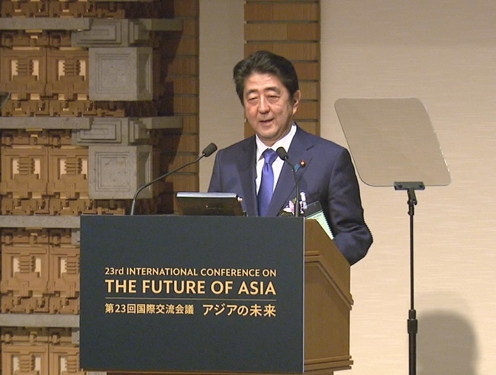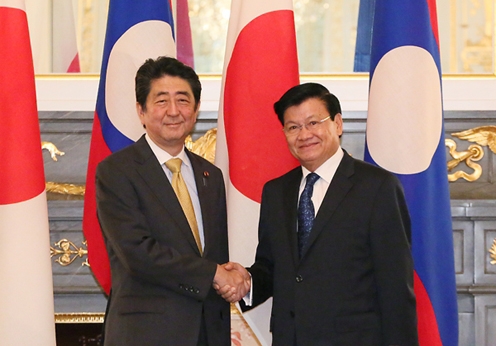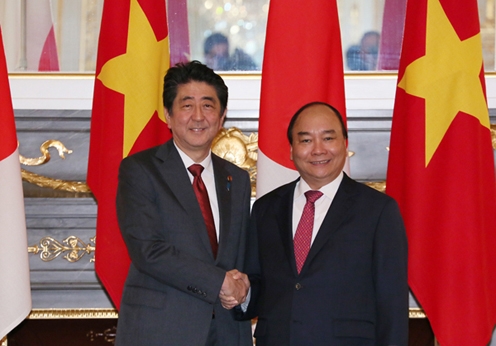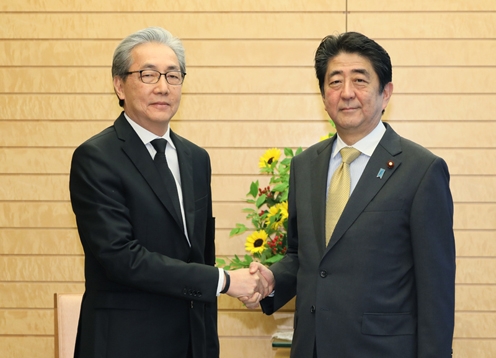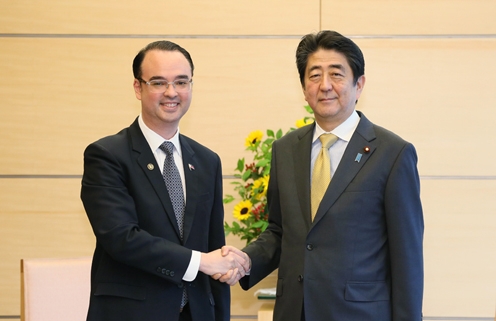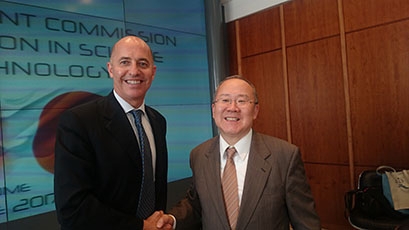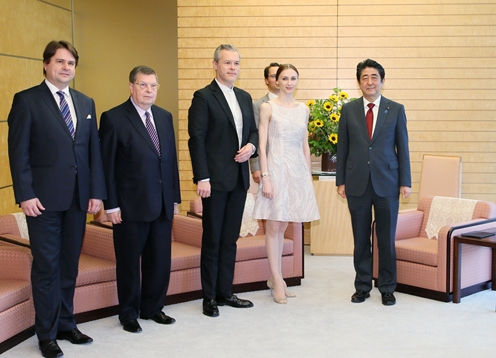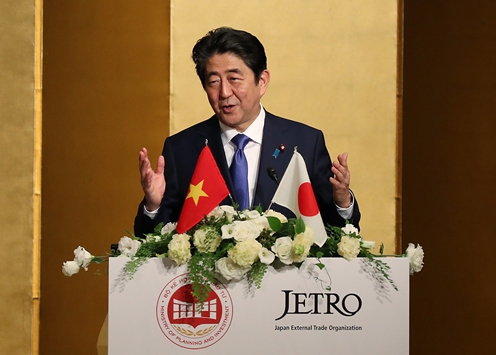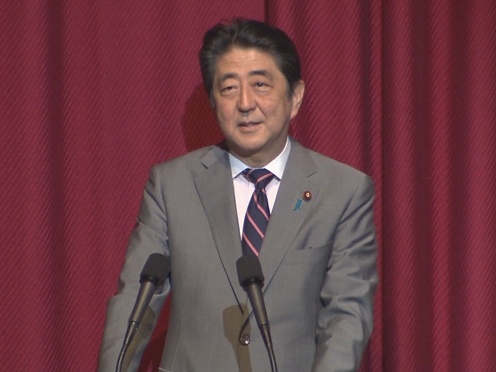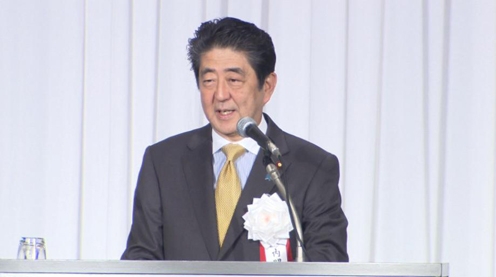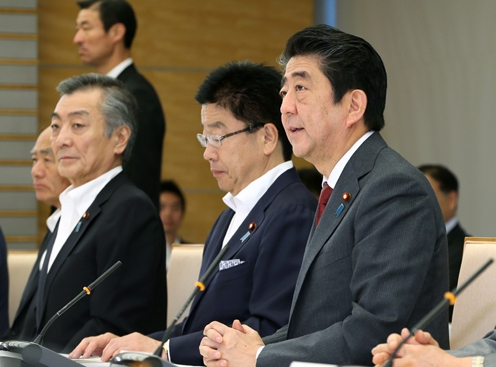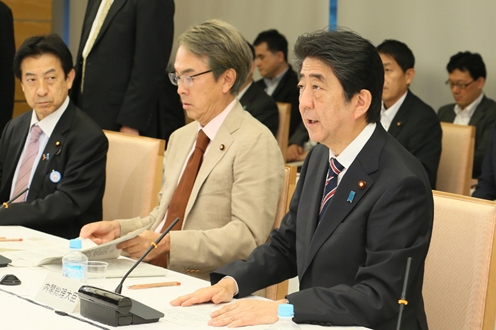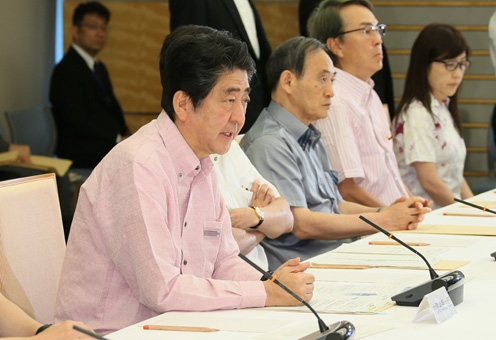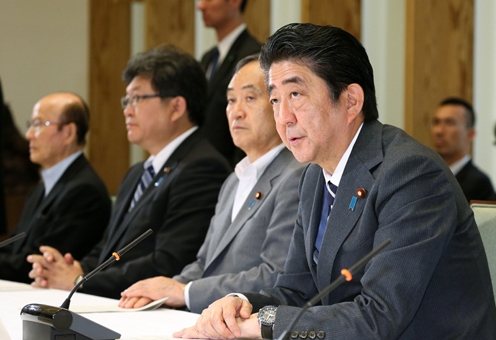"Asia's Dream: Linking the Pacific and Eurasia"
Cabinet Secretariat, Monday, June 5, 2017
[Provisional translation]
Thank you very much for the kind introduction.
It is truly an honor to see gathered here leaders I respect from all around Asia. I wish to thank the organizers for inviting me to join you.
(A virtuous cycle between growth and distribution)
At the G7 Taormina Summit, it was our discussions on trade and climate change that were in the spotlight. However, a common issue of interest for the leaders was what kind of society we should build going forward.
How should we respond to people who wonder if disparities in society will become more pronounced as a result of globalization and innovation, or worry they will be unable to keep up with such changes?
We need to face up to such apprehension squarely and respond to it, and make it possible for our citizens as a whole to feel, in a tangible manner, that they are enjoying greater prosperity.
Only then will we be able to maintain public support for free trade.
After I conveyed this point of view to my colleagues at the summit, the G7 was able to agree to keep our markets open and to fight protectionism.
In order to restore vitality to the economy, over the past four years, Japan has reduced corporate taxes, strengthened corporate governance, and undertaken reforms to regulations that had been as stubbornly unyielding as bedrock.
We have at the same time been working to bring about a society in which all citizens have a chance to fulfil their potential. This is a Japanese-style "inclusive society", in which anyone-old and young and men and women alike-can take advantage of opportunities, and regain their footing should they stumble along the way.
In order to ensure the fruits of growth are shared throughout the economy, I have called on large companies to make certain that all of their dealings with small- and medium-sized enterprises are made in a fair and proper manner. I have also called directly on companies to raise their workers' salaries.
Recent economic indicators are improving.
Even as the population is decreasing, our GDP has hit record levels.
Employment has expanded by 1.85 million people since my administration took office, with more than 80% of that being women entering the workplace.
The unemployment rate stands at 2.8%. Almost all young people newly graduating from university or high school are finding jobs.
We have come this far by aiming to create a virtuous cycle between growth and distribution.
It was in that context that we concluded negotiations on the Trans-Pacific Partnership Agreement, or TPP, and won Diet approval for the pact.
We succeeded in gaining public support for something the world had thought Japan could never do- high-level trade liberalization.
(A free and fair economic zone)
But it is not only Japan.
Viet Nam also undertook a major decision.
State-owned enterprises have played an important role within the Vietnamese economy.
The TPP was the very first multilateral trade agreement with rules formulated for such state-owned enterprises.
Many must have thought that surely Viet Nam would not accept rules governing its state-owned enterprises. Yet Viet Nam turned such thinking on its head and instead chose a path of promoting reform by leveraging the TPP.
I wish to express my respect to Prime Minister Phuc for the leadership he has shown.
Unfortunately, the TPP has yet to come to fruition.
However, I have not given up.
Japan achieved its historic economic growth through free trade.
When people engage in commerce and travel freely across national borders, a wide range of knowledge and experience is exchanged and new ideas spring up. It is this dynamism that will surely form the cornerstone for peace and prosperity around the globe.
In addition, it must be something open to all and something fair, in which those who work hard reap rewards.
So what would constitute rules for free and fair trade that are necessary for the Asia-Pacific region to develop? What kind of rules would enable not only major corporations but also SMEs and farmers to pursue overseas expansion without undue anxiety, protect originality and ingenuity, and ensure that added value is properly respected?
It was exactly those questions that the TPP negotiating countries spent countless hours discussing in earnest, finally culminating in the TPP agreement.
Just the other day, ministers from the TPP member countries came together in Hanoi.
With the leadership of Viet Nam, which chaired the meeting, the 11 countries-which we might call "Ocean's Eleven"-reached agreement to move the TPP forward.
Japan and the United States have launched a bilateral economic dialogue. We intend to create a rules-oriented framework between us that will serve as a model for Asia and the Pacific.
The Regional Comprehensive Economic Partnership, or "RCEP," which is our future goal, can become a high-quality agreement by building on the rules that came to fruition under the TPP.
Now, we are at a critical juncture.
Will we be able to expand a free, open, and fair economic zone going forward? Or will we make no progress for the time being? I believe we find ourselves at just such a watershed moment.
If we move forward, what we will see is a world in which high-quality rules cover an area from the Pacific to the Indian Oceans.
But wait, we can go even further.
I say this because Japan is negotiating a Free Trade Agreement with the EU as well. I want to see an agreement reached at an early time.
Let us move forward in order to advance free and fair trade. Together with all of you here who share this ambition, I intend to hold this flag high going forward.
I very much hope for your support.
(Asia' dream)
Asia is diverse in its cultures, its peoples, and its religions. We will advance economic integration while respecting diversity, from which our dynamism arises.
That is Asia's historic challenge.
It is precisely because we respect each other that we should uphold common rules and create a free and fair economic zone.
Asia's dynamism will link the Pacific and Eurasia. I believe this will become a dream shared in common by all the countries of Asia.
In order to make that dream a reality, we will concentrate Japan's assistance on building high-quality infrastructure and fostering highly skilled human resources.
Our financial cooperation amounting to some US$200 billion will come into motion this year.
(One Belt, One Road)
This year a landmark change occurred on the map of the Eurasian continent.
This year marked the first time that the city of Yiwu, China and the United Kingdom were connected by a freight train, which crossed the English Channel.
The "One Belt, One Road" initiative holds the potential to connect East and West as well as the diverse regions found in between.
Regarding infrastructure, there is a frame of thinking that is widely shared across the international community.
First of all, it is critical for infrastructure to be open to use by all, and to be developed through procurement that is transparent and fair.
I furthermore consider it essential for projects to be economically viable and to be financed by debt that can be repaid, and not to harm the soundness of the debtor nation's finances.
I would expect that the "One Belt, One Road" initiative will fully incorporate such a common frame of thinking, and come into harmony with the free and fair Trans Pacific economic zone, and contribute to the peace and prosperity of the region and the world.
Japan is ready to extend cooperation from this perspective.
(Contributions to be made through a "High Quality Infrastructure Partnership")
Japan is promoting its "High Quality Infrastructure Partnership."
We Japanese are very particular about some aspects of infrastructure.
It must be safe and it must be environmentally friendly.
The diligent and sincere people who work on the ground are solving problems and making sure these qualities are not compromised, day in and day out.
Prime Minister Modi said that, "Bringing in a Japanese bullet train"-the Shinkansen-"will not just realize high-speed rail but serve as a major catalyst for the modernization of India's rail system overall."
Mr. Modi was well aware that Japan's cooperation does not stop until technologies and skills, including those for maintenance, take root in the area where the infrastructure is being developed.
(Infrastructure cooperation in Lao PDR)
In 1963, the Kurobe River No. 4 Hydropower Plant of Kansai Electric Power Company, better known as "Kuro-yon," was completed. Taking seven years and an investment of 10 million worker-days due to the challenges posed by the precipitous terrain, the plant was called "the most difficult engineering project of the century."
The Nam Ngiep 1 Hydropower Plant in Lao PDR is referred to as the "second Kuro-yon."
Kansai Electric Power Company, which handled the construction of the original Kuro-yon plant, is now working with counterparts in Lao PDR and Thailand towards the start of commercial operations in 2019.
One thousand local jobs have been created.
Moreover, the company is about to begin the transfer of operating technology over the long term, to assist in the plant's operations.
Prime Minister Thongloun, please look forward to the plant's completion.
(Infrastructure cooperation in Viet Nam)
Hanoi City Urban Railway lines 1 and 2 will relieve some of the traffic jams and air pollution resulting from Hanoi's rapid urbanization.
But that is not all.
Ladies and gentlemen, have you ever ridden the subways in Tokyo?
The trains run on time.
Operations are controlled electronically. Collision accidents do not occur.
You don't even need a ticket. You can go anywhere by using a single card. But don't forget to charge your card with some money before you set out.
Stations are no longer merely stations-you can use the charged card that serves as your ticket to go shopping or buy a meal.
That very same card will allow you to transfer to a bus or a taxi.
Stations are also connected to the buildings around them, so you can visit those surrounding buildings without getting wet when it's raining.
How convenient and comfortable can we make the travel experience? The entire experience is permeated with the Japanese approach of uncompromising dedication to detail, together with ingenious Japanese ideas.
Now we're passing on this combination of "uncompromising and ingenious" work.
As a first step, I hear that not only the design of the Hanoi City Urban Railway but also the nearby operating bus routes and the layouts of the areas immediately surrounding the stations were formulated together with partners in Hanoi.
How the streets of Hanoi will change going forward is something to really look forward to.
(Society 5.0)
The speed at which innovation occurs is truly remarkable.
Changes have reached the front lines of manufacturing in Asia.
Consider machine tools operating in the factories of Thailand.
Rotating lights are attached to the tops of machines to indicate the state of operations.
If a breakdown occurs, that rotating light switches on. A signal reacts to that light, and through the Internet, a message arrives at the company's headquarters in Japan.
The headquarters would use the experience it has accumulated over the years to deduce possible causes of the breakdown and devise a response and then swiftly send back instructions.
As a result, the time needed to deal with the issue in the plant and the downtime for the manufacturing line drops dramatically.
Such innovations have already become run of the mill.
Data that has been collected via sensors linked through the Internet of Things, or "IoT," is accumulated in great quantities to become "big data," which artificial intelligence will analyze, giving rise to new wisdom.
The future holds unlimited possibilities.
One example is the unravelling of intractable illnesses.
By keeping watch over patients across an extended period, data will accumulate, enabling us to see the mechanisms behind the causes of the occurrence or worsening of the illness. Beyond that, we expect to find clues for medical treatment.
Self-driving vehicles are another example. Detecting what's happening on the road, how pedestrians are moving and where obstacles exist, these vehicles will become able to avoid dangerous situations automatically.
There are high hopes that in an increasingly aging society such as Japan, this will let people move about without hesitation even after getting older and losing confidence in one's ability to drive.
Yet another example is found in agriculture.
If the experience and intuition of master farmers are captured as data and combined with data such as how plants ate growing and what the weather has been like, farmers without much experience will also be able to harvest farm products that are delicious and safe.
However, the cultivation methods derived from such data may not be perfect.
When we encounter unknown circumstances, the wisdom of people with an abundance of experience may surpass artificial intelligence. However, that wisdom will in time also be captured as data and artificial intelligence will become smarter still.
We might consider this the "aufheben of intellect and technical skills."
We call the new society into which we are about to set foot "Society 5.0." It will be the fifth society, brought about by the fourth Industrial Revolution, hence "Society 5.0."
The essence of Society 5.0 is that it will become possible to elicit quickly the most suitable solution that meets the needs of each individual.
We will become able to solve challenges that have defied resolution until now.
Japan hopes to take advantage of AI and big data to overcome the challenges posed by its low birthrate and aging society and increase its dynamism going forward.
I do not fear that the spread of AI will deprive people of jobs; instead, I view it as an opportunity for people to shift into more creative jobs.
Japan aims to be "exhibit number one" proving that growth can be achieved through innovation, even if the population decreases.
In order to achieve this, we will develop systems for cultivating human resources so people can continue to learn new things throughout their lives and take up new jobs in growing fields.
(Calling Asia's youth to Japan)
"I want to go to Japan to see what it's like."
"I want to help create Society 5.0."
This April, Japan created a new process making it possible for young people and professionals who think this way to come to Japan from all around the world without hesitation.
People who surpass a certain number of points and have worked in Japan for just a single year will be able to apply at once for a "green card"-that is, permanent residency. This is among the fastest speeds in the world.
Wait times for visa applications will also be short. As a rule, the applicant will hear the result within ten business days.
We want to borrow more of the energy of young people from all around the world.
We will clear a path and point the way forward for young people who are even slightly interested in Japan, from the study of the Japanese language to jobs related to Japan.
We will choose three locations in Asia to nurture Japanese language teachers.
We will provide opportunities for Asian high school students studying Japanese to live in Japan for ten months. This will be at a scale of 1,000 students over the next five years.
We will also set up a window at Japanese diplomatic offices abroad and at JETRO offices so that people who want to work in Japan can readily make inquiries. I would be very pleased if you make use of this.
I would like to ask Dr. Sommawan Khumpuang, if you are here today, to please stand up.
Dr. Sommawan is developing a "minimal fab" at the National Institute of Advanced Industrial Science and Technology (AIST), one of Japan's largest public research institutions.
As the name implies, minimal fabrication, or "minimal fab," produces semiconductors on very small wafers having a diameter of little more than a centimeter.
This is ground breaking technology that can reduce capital investment to one-one thousandth of what is normally needed.
And Dr. Sommawan Khumpuang was absolutely critical to its development.
I wish to make Japan a country friendly to people like her where they find it easy to live and pursue truly rewarding work. Now that I see her in person, I have renewed my commitment to making this come about.
(Conclusion)
Today I have spoken about a wide variety of policies I have been undertaking: a society in which all citizens have a chance to fulfil their potential; a free and fair economic zone that is open to all, in which people who work hard reap rewards; high-quality infrastructure supported by the people in the field; and Society 5.0, which derives the most suitable solutions meeting each individual's needs.
Although these policies address different areas, there is one thing they all have in common. They are all geared towards valuing each and every individual. This is the thinking that lies at the foundation of everything.
If we were to unleash the abilities of every single person in Asia and let them fulfil their potential, the resulting force would be truly tremendous.
Linking the Pacific and Eurasia.
Ladies and gentlemen, going forward, let us together make "Asia's dream" come true.
Thank you very much for your kind attention.
Speech by Prime Minister Shinzo Abe at the Worldwide Officers Meeting of the Boston Consulting Group
Cabinet Secretariat, Monday, May 22, 2017
[Provisional Translation]
Good evening everyone. Welcome to Tokyo. My name is Shinzo Abe.
I heard that close to 1,000 officers of the Boston Consulting Group (BCG), who advise business leaders all over the world, would be in attendance this evening, together with their families, and so I decided to come and offer my sincere welcome to you all.
The evening in Tokyo is rather bright, is it not? And yet Japan's CO2 emissions are not increasing. This is because Japan is a world leader in the use of LEDs. Furthermore, it is above all due to the many stars that shine above the city streets. I am referring of course to the fact that Tokyo is home to 227 Michelin-starred restaurants, more than any other city in the world.
Under the Abe administration, Japan has undergone great changes. I believe that today you discussed the opportunities and appeals in Japan's regional areas. Japan's regions are full of hidden resources and assets, and I hope that you will learn more about them.
Abenomics sets out two major targets for inbound demand. These are to increase the number of visitors to Japan, and also to increase foreign direct investment (FDI) in Japan.
Under the previous Cabinet, the annual number of inbound visitors stood at 8 million. Immediately after the inauguration of the Abe administration, with great determination, we boldly introduced waivers or relaxation of visa conditions, and also improved the duty-free system. Momentum among the Japanese people to provide omotenashi, or hospitality, is also increasing. As a result, last year, the annual number of overseas visitors to Japan reached 24 million, thus tripling over the course of four years. Wonderful scenery and flavors from all over Japan, some of which even the Japanese people themselves have not noticed, are gaining publicity throughout the world. We are aiming for 40 million inbound visitors to Japan in 2020.
FDI in Japan, on the other hand, is showing little signs of growth. Our target is 35 trillion yen in net investment by 2020 but as of the end of 2015 the amount stands at 24 trillion yen, which is two-thirds of our target. Low FDI in Japan has continued to be a challenge for many years.
Japan may be seen as distant, closed, and expensive.
However, I believe that Japan cannot develop further unless business conditions are attractive to foreign businesses, and that the Japanese system must take into account the perspective of foreign businesses. I therefore highly welcome any views you may have in this regard.
Under Abenomics, we have reduced the effective corporate tax rate over the past four years. Last April it reached the 20%-29% range. In the coming fiscal year we will reduce the effective corporate tax rate to a level similar to that of Germany.
Japan is also advancing negotiations of the Japan-EU Economic Partnership Agreement (EPA) with the EU. If the agreement is reached, it will further improve the environment for European companies to invest in Japan.
If you take a look at the actual conditions in Japan, you will find that it is full of sources of innovation. For example, Japan has many small- and medium-sized enterprises equipped with outstanding materials and technologies. They produce prototypes in a short period of time, while still paying maximum attention to detail. In addition, when the Japanese companies produce parts, they take the initiative and come up with ways to further improve the functions of the parts as they process them. The depth and strength of Japan's supporting industries is not something that can be found in any other country.
Furthermore, Japanese users are rigorously exacting. Combining all these elements with excellent resources from abroad has given rise to many revolutionary products.
For example, cosmetics company L’Oréal has applied the technologies of a Japanese pigment manufacturer to produce brightly-colored lipsticks and foundations that were previously not possible. The company also developed BB cream for Asian consumers based on research it conducted on Japanese people's skin. I have been told that the product is highly popular throughout Asia.
New developments are also occurring in the tourism sector. Hong Kong-based Mingly Corporation acquired the rights to operate Chikusenso, a hot spring resort in Zao that had gone bankrupt, and introduced the knowhow that it has built up from operating spa resorts in Thailand and Singapore. As a result, it has successfully assimilated itself into Japan's traditional culture, and visitors from all over Japan and the world are flocking to stay at Chikusenso.
I will break down all the barriers that prevent people from taking on challenges and build an environment that is innovation-friendly. Recently, Apple opened a development center in Yokohama. In the field of regenerative medicine and gene therapy as well, there are a number of American venture companies opening cutting-edge R&D centers in Japan, as a result of our efforts to speed up the product approval process.
"Made in Japan" has long been a synonym for outstanding quality. Now, with the help of foreign companies who have accumulated a wealth of experience around the world, it has evolved to become "Created in Japan," and is well-received around the world.
Is Japan really so distant? Regardless of whether or not it is physically distant from Europe and the United States, Japan is the closest gateway to Asian markets, the growth center of the world. I hope you will change your view of Japan, and see that it is full of opportunities for innovation that leads to new products and services.
Is Japan really so closed to the outside world? I am changing this aspect of Japan. It is now possible for highly-skilled professionals to receive a work visa within 10 days. There is also no limit to how many people can receive such visas. I have also created a Japanese-style green card for highly-skilled foreign workers, which will make it possible to apply for permanent residency in Japan after only one year of living in Japan.
Finally, is Japan really so expensive? Please compare the prices of hotels in Japan and those in Europe and the United States. Or take a look at the cost of renting an office in Hong Kong or Beijing. If you go from Tokyo to the regions, prices are significantly lower. The amount of greenery is also significantly higher and the air cleaner. I am sure you are also well aware of the high levels of public safety and infrastructural reliability in Japan.
I hope you will experience for yourselves the fact that, in Japan, there are many opportunities, not only in Tokyo but also in the regions. I hope you will share that experience with business leaders around the world.
Allow me to make one last point. I understand that the last time this meeting was held in Japan was 34 years ago. It pains me to think that it could be another 34 years before the next meeting here. The thought saddens me. I hope that you will once again hold the BCG Worldwide Officers Meeting right here in Japan. We will welcome you with open arms.
Thank you for your kind attention.
Speech by Prime Minister Shinzo Abe at the CEO Council Dinner Program Hosted by the Wall Street Journal
Cabinet Secretariat, Tuesday, May 16, 2017
[Provisional Translation]
Good evening ladies and gentlemen and thank you for inviting me to this event. I am Shinzo Abe. I am delighted to see so many people from the United States and various countries in Asia. I very much hope that you will enjoy your stay in Japan.
More than four years have passed since we retook the reins of government. Prior to that, under the administration of the Democratic Party of Japan, this country was enveloped by a sense of resignation and pessimism. The economy was in a deflationary spiral. Japan was unable to make its presence felt in the international arena.
Growth is no longer possible as the population is shrinking. Japan is already in its twilight years. These were the laments we heard and the wall of hopelessness that we faced. Back then, the stock market index was at the 8,000 yen level, less than half of its current level. I stood up to the challenge of breaking down this wall. My goal was to "take Japan back."
So what results have we achieved? Over the past four years, through our economic policies nominal GDP has grown 9.5 percent, increasing by 47 trillion yen to reach an all-time high. Employment, which had shrunk by 290,000 jobs under the previous administration, has increased by 1.85 million jobs over the past four years, despite the decreasing population. What is more, 82 percent of these new jobs are filled by women. Unemployment stands at 2.8 percent, meaning that we have achieved almost full employment. In the past two years the number of regular employees has also increased by 790,000. Just so you know, prior to my administration the number of regular employees had fallen by 550,000.
The number of inbound visitors to Japan has also surged. Prior to my administration, Japan received 8 million foreign visitors annually, but by last year this figure had increased three-fold to stand at 24 million visitors a year. Immediately after the start of this administration we boldly introduced implement waivers or relaxation of visa conditions and also improved the duty-free system. Momentum among the Japanese people to provide omotenashi, or hospitality, is also growing. By the time of the 2020 Tokyo Olympic and Paralympic Games, we aim to welcome 40 million visitors a year to Japan.
In terms of tax revenues too, national tax revenues have increased by 15 trillion yen since the change of government and local tax revenues have seen growth in all 47 prefectures of Japan.
Speaking of all prefectures, the ratio of jobs to applicants is above 1.0, or in other words, there are more jobs available than there are people seeking employment. Now, this is the case in all prefectures. It is the first time in the history of Japan.
If this situation continues it will also lead to increases in wage levels and bring us closer to our goal of exiting deflation.
In the Diet, deliberations on the national budget for fiscal 2017 proceeded according to schedule and the draft budget was approved without any amendment. With the approval of the fiscal 2017 budget, since April we have had lower employment insurance premiums, thereby further increasing disposable income for workers. A new scholarship system was also introduced and initiatives were implemented to achieve zero children on waiting lists in order to enhance opportunities for university students and children, respectively, among other measures.
Furthermore, we have submitted eight draft bills on agricultural policy reforms. If all of these bills are passed they will result in agricultural policy reforms on an unprecedented scale. A final proposal for work-style reform has also been compiled and draft bills will be presented to the Diet.
In order to enable the younger generation to balance work and child rearing, we will also be using the new FY budget to accelerate the increase in the number of childcare facilities and the improvement of the employment conditions of childcare workers. We are also working to develop nursing care facilities and secure sufficient nursing care workers, so that people who wish to work do not have to give up their jobs to care for elderly parents.
If we take a look at the situation for companies, in the four years since the inauguration of my administration corporate earnings have grown by 22 trillion yen. These earnings should not be retained inside companies as it would put the brakes on further growth.
I will continue to make every effort to ensure that the fruits of growth are circulated nationwide, through calling for increased wages to boost the purchasing power of employees, as well as for appropriate business practices between large companies and small- and medium-sized enterprises (SMEs).
Factoring in the redistribution of income through the payment of taxes and social insurance premiums and the receipt of benefits, the Gini coefficient is also turning downward.
Moreover, we are creating a conducive environment for profits to be reinvested in the future. This will lead to an increase in consumption and improved productivity.
Looking ahead, there is absolutely no change to my policy of putting the economy first and exiting deflation, by continuing to shoot the three arrows of monetary policy, fiscal policy, and structural reform.
Economic growth for Japan and stability in people's livelihoods cannot be realized without working closely and collaborating with the global economy. Ensuring peace and security is the foundation in this regard. To that end my consistent fundamentals for running the administration are to strengthen the Japan-U.S. Alliance and further broaden the scope of diplomacy with countries in the Asia-Pacific region.
As a nation lacking natural resources and surrounded by oceans, Japan has long engaged proactively in activities overseas.
Japanese companies of all sizes, from large companies to SMEs, have expanded their businesses while assisting in nation-building in the countries of Asia and contributing to local employment creation in Europe and North America. Just two weeks ago Japan announced the contribution of US$40 million to a new fund of the Asian Development Bank (ADB). This fund is an initiative to advance the introduction of advanced technologies in the areas of environment and transportation infrastructure. In order to develop quality infrastructure, the US$200 billion in funding provision that has already been announced will be at full-throttle by the end of this year.
I am the Prime Minister of Japan and therefore, for me, it's "Japan first." But please listen carefully. This Japan that I speak of is one that advances side by side with global prosperity and peace.
Since last year a series of general elections and national referendums in many countries have made new leaders emerge. In the G7 alone, this has been the case in the United Kingdom, the United States, Italy, and France. Last week there was also a change of leadership in our neighbor the Republic of Korea. It has been a year in which the eyes and ears of the world have been focused on the choices made by the people of these countries.
Among the issues that have attracted attention in those processes are skepticism about free trade and concerns about the structure of society.
General elections are also scheduled in the United Kingdom and Germany this year. In the autumn a top leadership personnel placement is expected in China and in the spring of next year there will be a presidential election in Russia.
I have consistently emphasized the importance of free trade. This is because when individual creativity and innovation are fully harnessed, and the results of such creativity and innovation go beyond national borders, we can expect the development of prosperous societies promoted around the world.
In addition, especially at the present time, when the entire world faces various difficult challenges, including global warming and the imminent aging of society, exchanges of various knowledge and experiences among people that transcend national borders hold the key to solving the issues we face.
National governments must reduce the barriers that negatively impact the activities of people, and strengthen mechanisms that will fairly and justly protect the outcomes of innovation.
In order to steadily advance free trade, appropriate transition periods will be given in advancing reforms in the industries and sectors that will be affected. Furthermore, we are also engaged in efforts to promote the activities of Japanese SMEs overseas and create markets for Japanese food products overseas. If many countries harmonize their rules, customs clearance and shipment costs will be expected to be reduced.
I would like to note that we must not consider trade in zero-sum terms, whereby if one side gains, the other side loses.
Since the start of this century many emerging and developing countries have acceded to the World Trade Organization (WTO). However, in some countries there is still insufficient enforcement of WTO rules, including forced demands for the technology transfer to receiving states, a lack of discipline in state-owned enterprises, and non-compliance even when rules are in place.
Rules to protect intellectual property rights also need to be further strengthened, precisely because the world today is in vital need of innovation.
The Trans-Pacific Partnership (TPP) Agreement was formulated to respond to such concerns.
Therefore, I remain firmly convinced that the TPP is essential for the Asia-Pacific region, which is the growth center for the global economy. This weekend a ministerial meeting of 11 signatory nations to the TPP will be convened.
I look forward to advances in discussions in that meeting.
Last month Vice President Pence and Deputy Prime Minister Aso held the first Japan-U.S. Economic Dialogue, in which they confirmed that our two countries will discuss common strategies relating to rules and issues on trade and investment in the dialogue.
Not only do we seek to accelerate and reinforce the flows of trade and investment between Japan and the United States, we also seek to disseminate high-level and fair rules throughout the Asia-Pacific region, with Japan and the United States at the forefront of such efforts.
Finally, I would like to say a few words about the future. You may be concerned about Japan's future growth, given the declining population due to a falling birthrate and aging population.
Although previously it was taboo to set targets for improving the birthrate, my administration is aiming to achieve the desired birthrate of 1.8 by the early 2020s and we are currently engaged in various measures, including enhancement of childcare services.
I am also focusing on investment in human resources. By promoting the introduction of robotics and artificial intelligence (AI), we aim to fully equip people to harness their productivity and achieve even greater results.
We are also accepting foreign workers in Japan, particularly those with specialist skills. Last year the number of foreign workers in Japan exceeded one million for the first time.
I am aiming to achieve a society with the dynamic engagement of all citizens, a society in which every person can fully harness their skills. This is a concept for inclusive society à la japonaise, where each and every person can shine. The active role of women is the key to growing the Japanese economy.
The vast experience and high levels of education of women still remain dormant. We seek to not only increase the total number of women in employment, but also promote women to positions of greater responsibility and leadership in the workplace. This year, with the cooperation of Harvard Business School, we have also initiated a program for the training of women with the potential to become managers.
I believe that innovation is advanced through the interaction of diverse values and the experiences of individuals, and that this will lead to the creation of products and services with new value, and promote the development of new social systems.
Meanwhile, we cannot allow ourselves to become less cautious. Despite strong warnings from the international community, two days ago North Korea conducted yet another ballistic missile launch.
The threat posed by North Korea has become even greater. Terrorism is also spreading around the world and ISIL's maneuverings continue. We must maintain an unprecedented sense of vigilance and strengthen international cooperation in the face of such issues.
Without peace and stability there can be no growth and prosperity. Not only does North Korea pose a threat, unilateral attempts to change the status quo by force in the East China Sea and South China Sea are continuing.
The rule of law has been infringed upon and freedom of navigation is also under threat. It is against this backdrop that Japan is strengthening the bonds of its alliance with the United States more than ever before and is working closely at every level from the summit level through to defense cooperation on the ground.
We are deepening our maritime security cooperation with the Association of Southeast Asian Nations, including assistance to build capacity in the area of maritime security.
The weekend after next the G7 Summit is scheduled to be held under the Presidency of Prime Minister Gentiloni of Italy, and attended for the first time by President Trump, President Macron, and Prime Minister May.
At the summit we will strengthen the solidarity among leaders who share universal values and set out a path that the world should take.
I intend to contribute to the summit meeting, both as the chair of last year's G7 Ise-Shima Summit, and also based on my experience of Summit meetings to date.
Thank you for your kind attention.
Japan-Lao PDR Summit Meeting and Other Events
Cabinet Secretariat, Wednesday, June 7, 2017
Prime Minister Shinzo Abe hosted a summit meeting and other events with H.E. Dr. Thongloun Sisoulith, Prime Minister of the Lao People's Democratic Republic, at Akasaka Palace State Guest House.
The two leaders attended a salute and guard of honor ceremony, followed by a summit meeting. Thereafter, the leaders held a joint press announcement.
Japan-Viet Nam Summit Meeting and Other Events
Cabinet Secretariat, Tuesday, June 6, 2017
[Provisional Translation]
Prime Minister Shinzo Abe hosted a summit meeting and other events with H.E. Mr. Nguyen Xuan Phuc, Prime Minister of the Socialist Republic of Viet Nam, at Akasaka Palace State Guest House.
The two leaders attended a salute and guard of honor ceremony, followed by a summit meeting. Thereafter, the leaders held an exchange of documents and a joint press announcement.
Finally, the Prime Minister hosted a banquet, and said in his address,
"Firstly, I would like to apologize for keeping you all waiting for such a long time. Our discussion at the summit meeting was so lively that we became late. Please forgive us, as this happened because my relationship with Prime Minister Phuc has become so friendly.
I would like to offer my heartfelt welcome to Prime Minister Phuc and Mrs. Phuc upon their visit to Japan. The great welcome we received when my wife and I visited Viet Nam again this January continues to remain in our hearts.
In November, the Asia-Pacific Economic Cooperation (APEC) Economic Leaders' Meeting will take place in Da Nang, which is close to Prime Minister Phuc's hometown. It will be the first time for me to visit Da Nang. I have heard that its seafood is famous. I look forward to the achievement of great success for the APEC meeting under the skillful leadership of Viet Nam as host country, and to freely enjoying the delicious seafood.
The visit to Viet Nam of Their Majesties the Emperor and Empress of Japan opened a new page in the friendly relationship between Japan and Viet Nam. Next year will mark the 45th anniversary of the establishment of diplomatic relations between Japan and Viet Nam. I would like us to further deepen our exchanges in a wide range of fields such as politics, the economy, culture, and sports.
Today Ambassador Ryotaro Sugi, who serves as Goodwill Ambassador between Viet Nam and Japan, and who also accompanied me on my visit to Viet Nam in January, is in attendance. Ambassador Sugi has significantly contributed to and driven our bilateral exchanges for almost 30 years, and I look forward to his continued activities.
The deepening of our bilateral relationship can also be seen in our people-to-people exchanges. Last year the number of technical intern trainees from Viet Nam studying in Japan reached about 90,000, making it the top origin country. The number of overseas students from Viet Nam in Japan exceeded 60,000. In attendance today are Ms. Luong Thu Huong from the Government of Viet Nam, who is currently studying at Hitotsubashi University; Mr. Bui Quoc Hung, who is currently studying at the National Defense Academy of Japan; and Mr. Nguyen Son Ha, who came to Japan as a candidate nurse and has admirably succeeded in obtaining Japan's national certification. I would like them to build on their experiences of learning in Japan to contribute to the future of Viet Nam and to serve as bridges between our two nations.
Also, although he is not at this banquet, recently Mr. Le Thanh Chung, a young student from Viet Nam, dived into a river to save a Japanese woman who had entered the river in a suicide attempt. Mr. Le is a student who works part-time at a shop selling used tires while studying in Japan. I would like to applaud Mr. Le's courage and express my thanks to him.
Although I cannot introduce them all individually, there are numerous people who are active for the bonds between Japan and Viet Nam, including the many students from Viet Nam in Japan, as well as businesspeople, those active in cultural fields, and scholars. From among them, we have invited to today's banquet leaders from all areas in many different fields, including politics, the economy, academia, and culture, all of whom are supporting the invaluable friendly relations between our two countries. Thanks to all of you, the wonderful relationship between Japan and Viet Nam is what it is today. I would like to take this opportunity to express my gratitude to all of you, and my hope that you will continue to work with us toward the further development of this relationship.
I would now like to raise a toast to the continued health and success of Prime Minister Phuc and Mrs. Phuc and all those in attendance today, to the increasing prosperity of Viet Nam, and to the further development of the relationship between Japan and Viet Nam."
Courtesy Call from the Deputy Prime Minister of Thailand
Cabinet Secretariat, Wednesday, June 7, 2017
Prime Minister Shinzo Abe received a courtesy call from H.E. Dr. Somkid Jatusripitak, Deputy Prime Minister of the Kingdom of Thailand, at the Prime Minister's Office.
Courtesy Call from the Secretary of Foreign Affairs of the Philippines
Cabinet Secretariat, Wednesday, June 7, 2017
Prime Minister Shinzo Abe received a courtesy call from H.E. Mr. Alan Peter S. Cayetano, Secretary of Foreign Affairs of the Republic of the Philippines, at the Prime Minister's Office.
14th Japan-Italy Joint Committee on Science and Technology Cooperation
Foreign Affairs, Thursday, June 8, 2017
The fourteenth Japan– Italy Joint Committee on Science and Technology was held in Rome, on the 7th of June 2017, at Palazzo della Farnesina, headquarters of the Italian Ministry of Foreign Affairs and International Cooperation (MAECI). Science and Technology is one of the pillars of the cooperation between Japan and Italy that celebrated in 2016 their 150th anniversary of their diplomatic relations.
The meeting was organized under the terms of the Agreement between the Government of Japan and the Government of Italy on Cooperation in Science and Technology, signed in Tokyo on the 7th of October 1988.
The Joint Committee was co-chaired by Mr. Takeshi Nakane, Ambassador for Science and Technology Cooperation, Ministry of Foreign Affairs of Japan and Mr. Fabrizio Nicoletti , Central Director for Research and Innovation, Ministry of Foreign Affairs and International Cooperation of Italy. The Joint Committee was held with the participation of high-level representatives from the relevant ministries, funding agencies and research institutions of both countries.
The Joint Committee noted recent activities and the progress with the cooperation in the fields of space, energy and environment, agriculture and food science, geophysics and volcanology and health.
The participants in the Joint Committee exchanged views on science, technology and innovation policy, international collaboration and related issues. Particular focus was given to new developments such as the Fifth Science and Technology Basic Plan in Japan and the “Society 5.0” project proposed in it as well as the "Programma Nazionale della Ricerca 2015-2020" in Italy.
With regard to the collaborative schemes for science, technology and innovation (STI) cooperation, the representatives from Japan and Italy reviewed the valuable research collaboration currently being undertaken within the framework of the Executive Programme or through joint research projects carried out between Japanese and Italian research institutions and were pleased to note the high level and quality of the research outcome.
It was proposed to hold the next Joint Committee meeting in Japan; the specific date of the meeting will be coordinated through diplomatic channels.
Courtesy Call from a Principal Dancer of the Russian Bolshoi Ballet, a Violinist, and Others
Cabinet Secretariat, Tuesday, June 6, 2017
Prime Minister Shinzo Abe received a courtesy call from Ms. Svetlana Zakharova, Principal Dancer of the Bolshoi Ballet of the Russian Federation, Mr. Vadim Repin, violinist, and others at the Prime Minister's Office.
Conference on Investment Promotion into Viet Nam
Cabinet Secretariat, Monday, June 5, 2017
[Provisional Translation]
Prime Minister Shinzo Abe attended the Conference on Investment Promotion into Viet Nam held in Tokyo.
In his address, the Prime Minister said,
"I would like to extend my heartfelt welcome to Prime Minister Nguyen Xuan Phuc and members of the Vietnamese business community upon your visit to Japan.
I place great importance on Japan's relations with Viet Nam. I visited Viet Nam together with an economic mission of approximately 130 people during my first administration in 2006. It was my first time promoting Japan at the highest level. Thanks to that visit, the number of Japanese companies operating in Viet Nam has grown remarkably.
After becoming Prime Minister once again, Viet Nam was the first country I visited. I am overjoyed to see the development of our relationship in all fields, including politics, the economy, culture, and human exchanges under our Extensive Strategic Partnership.
Their Majesties the Emperor and Empress of Japan recently visited Viet Nam for the first time. It was a historic visit that lifted our bilateral relations to new heights.
This is the fifth time that I have met with Prime Minister Phuc. I am certain that our economic relations will continue to develop under the leadership of Prime Minister Phuc. When I visited Viet Nam in January, I held a summit meeting with Prime Minister Phuc that included members of the business community. Prime Minister Phuc listened with enthusiasm to the opinions of Japanese companies.
Together with Prime Minister Phuc, I will continue to support active investments by Japanese companies through the development of high quality infrastructure, improvements to the investment environment, and the fostering of human resources. I hope that Prime Minister Phuc as well will continue to consider the views of Japanese companies.
The world is also watching Viet Nam. This is because Viet Nam is actively working on the Trans-Pacific Partnership (TPP) and the Regional Comprehensive Economic Partnership (RCEP), and is promoting domestic reforms.
This momentum must not come to a halt. Japan will work together with Viet Nam to steadily promote free trade.
The 11 TPP countries are working together to that end and will aim to bring this to fruition. Furthermore, it is important that we aim to make the RCEP a high quality agreement based on the outcomes of the TPP, and promote such efforts on a step-by-step basis. Viet Nam will host the Asia-Pacific Economic Cooperation (APEC) Economic Leaders' Meeting in November. Japan will extend its full cooperation toward the success of the APEC meeting in Viet Nam. We will extend our utmost cooperation so that we can produce significant results that promote free trade at the Economic Leaders' Meeting.
I sincerely hope that this visit by Prime Minister Phuc will further advance Japan-Viet Nam economic relations. Finally, I wish to conclude my remarks with the promise that I will do everything I can together with Prime Minister Phuc."
The Russian Seasons Opening Ceremony
Cabinet Secretariat, Sunday, June 4, 2017
[Provisional Translation]
Prime Minister Shinzo Abe attended the Russian Seasons Opening Ceremony held in Tokyo.
The Prime Minister said in his address,
"I wish to extend my heartfelt welcome to Deputy Prime Minister Olga Golodets and everyone else in attendance at this Russian Seasons Opening Ceremony. It is now possible to see Giselle performed by Ms. Svetlana Zakharova and Mr. Denis Rodkin of the Bolshoi Theatre here in Tokyo. This dream come true is taking place here, tonight.
It has been made possible by Russia, which, under the auspices of President Vladimir Putin, decided to implement the Russian Seasons program, through which it will host cultural events around the world, and selected Japan as the first country to host the program.
I welcome President Putin's desire to further promote cultural exchanges with Japan. I, too, intend to promote and place importance on cultural and human exchanges between Japan and Russia.
I am sure that there are many aspects of Russian culture that appeal to the sensibilities of Japanese people. For instance, there are many Japanese people who dearly love Russian works of literature and music.
Next year, we will hold a 'Russia Year in Japan' and 'Japan Year in Russia,' to introduce the cultures of our countries to each other. It is my hope that such cultural exchanges, which have been propelled forward by the Russian Seasons program, will further flourish.
I hope that you will all join me in enjoying Giselle, as performed by Ms. Zakharova and Mr. Rodkin of the world-class Bolshoi Theatre, to your heart's content. Thank you."
Message of Condolence following the Terrorist Attack in London from Prime Minister Shinzo Abe
Cabinet Secretariat, Sunday, June 4, 2017
Dear Theresa,
I am greatly shocked by the atrocious terrorist attack occurred at the London Bridge, which is famous throughout the world, and the Borough Market where many citizens spend enjoyable time on weekends.
On behalf of the Japanese government and people, I would like to offer my heartfelt condolences to the victims as well as my sympathies to the wounded.
The peaceful weekend of innocent citizens was assaulted by the terrorists. I cannot help but feel strong indignation at this. In this difficult time, I wish to express our heartfelt solidarity with the British people.
At the G7 Summit Meeting in Taormina, Theresa and I, with other G7 leaders, expressed the strong determination to resolutely stand up against terrorism. In close cooperation with the United Kingdom and the international community, Japan will continuously strive to combat terrorism.
Sincerely yours,
Shinzo
Comment by Prime Minister Shinzo Abe on the Adoption of a Resolution by the United Nations Security Council concerning a series of ballistic missiles launches and other activities conducted by North Korea
Foreign Affairs, Saturday, June 3, 2017
1. Japan appreciates that the United Nations Security Council unanimously adopted Resolution 2356 (PDF)open, which expands sanction targets in response to a series of ballistic missile launches and other activities conducted by North Korea.
2. It is totally unacceptable that North Korea has been continuing provocations, disregarding the repeated warnings by the international community. Japan strongly urges North Korea to sincerely heed the voice of the international community and to implement Resolution 2356 and other series of relevant resolutions strictly and fully, and refrain from any further provocations, such as nuclear tests and ballistic missile launches.
3. At the recent Japan-United States summit meeting, the leaders reaffirmed the importance of strengthening pressure on North Korea through further sanctions upon North Korea and close coordination in the Security Council. Furthermore, at the recent G7 Summit, the leaders shared the view that the issue of North Korea is a top priority in the international agenda and that they stand ready to strengthen measures for denuclearization. Taking these into accounts, Japan, as a member of the Security Council, has contributed to the adoption of this resolution in close coordination with concerned countries, including the United States, the Republic of Korea, China and Russia. In order to further enhance pressure on North Korea, Japan will continue to work closely with countries concerned, including strictly implementing this resolution and ensuring its effectiveness to further enhance pressure on North Korea.
4. Towards a comprehensive resolution of outstanding issues of concern, including nuclear and missile issues as well as the abductions issue, which continues to be the most important, Japan will continue to strongly urge North Korea to take concrete actions under its principle of “dialogue and pressure” and “action for action”.
Comment by Prime Minister Shinzo Abe on the Adoption of a Resolution by the United Nations Security Council concerning a series of ballistic missiles launches and other activities conducted by North Korea
Cabinet Secretariat, Saturday, June 3, 2017
1. Japan appreciates that the United Nations Security Council unanimously adopted Resolution 2356, which expands sanction targets in response to a series of ballistic missile launches and other activities conducted by North Korea.
2. It is totally unacceptable that North Korea has been continuing provocations, disregarding the repeated warnings by the international community. Japan strongly urges North Korea to sincerely heed the voice of the international community and to implement Resolution 2356 and other series of relevant resolutions strictly and fully, and refrain from any further provocations, such as nuclear tests and ballistic missile launches.
3. At the recent Japan-United States summit meeting, the leaders reaffirmed the importance of strengthening pressure on North Korea through further sanctions upon North Korea and close coordination in the Security Council. Furthermore, at the recent G7 Summit, the leaders shared the view that the issue of North Korea is a top priority in the international agenda and that they stand ready to strengthen measures for denuclearization. Taking these into accounts, Japan, as a member of the Security Council, has contributed to the adoption of this resolution in close coordination with concerned countries, including the United States, the Republic of Korea, China and Russia. In order to further enhance pressure on North Korea, Japan will continue to work closely with countries concerned, including strictly implementing this resolution and ensuring its effectiveness to further enhance pressure on North Korea.
4. Towards a comprehensive resolution of outstanding issues of concern, including nuclear and missile issues as well as the abductions issue, which continues to be the most important, Japan will continue to strongly urge North Korea to take concrete actions under its principle of "dialogue and pressure" and "action for action".
General Meeting of the Japan Association of City Mayors
Cabinet Secretariat, Wednesday, June 7, 2017
[Provisional Translation]
Prime Minister Shinzo Abe attended the 87th General Meeting of the Japan Association of City Mayors held in Tokyo.
The Prime Minister said in his congratulatory address,
"I am delighted that the 87th General Meeting of the Japan Association of City Mayors is being held today in such magnificent fashion. I want to first express my respect to former President Mori for the tremendous achievements he has made as President of the Japan Association of City Mayors.
I would also like to express my sincere appreciation to all of the city mayors for making dedicated efforts every day at the front lines of local government to develop their communities and further improve the welfare of their residents.
The Abe Cabinet has tackled important policy issues, such as by expanding child rearing supports and nursing care, and promoting work style reform, in our pursuit to realize a society in which all citizens are dynamically engaged. Abenomics is definitely producing results in all corners of the country. The ratio of job offers to job seekers is 1.48, reaching its highest level in 43 years. This is the first time in history that the ratio is above 1.0 in all 47 prefectures, and we are seeing this trend continue. The employment ratio of high school graduates in FY2016 grew 0.3% year-on-year to 98%, the highest level in 26 years.
It is the regions themselves that are the main drivers of future growth. The national and regional governments will collectively make every effort to accelerate a positive cycle of growth and distribution, so that people in the regions can feel the results of that growth. Japan will not have vitality unless its regions have vitality. There is no future for Japan unless we pave the way for the future of the regions. This is the basic stance of the Abe administration.
Japan is full of charms, such as abundant nature, unique history and culture, and agricultural, forestry and fishery products and foods particular to each region, all of which have been preserved and developed by everyone in each region. Those charms are now even well-known overseas. The number of annual foreign visitors to Japan has set a record for four consecutive years, with this number exceeding 24 million last year. The number of foreign cruise ships visiting the regions in Japan has quadrupled in just three years. During the season of festivals and fireworks shows, which are major tourism resources of the regions, it can be difficult for visitors to secure hotels and means of transportation. However, if visitors use cruises, their accommodations and mode of travel are unrestricted. We are seeing a rising popularity of innovative cruise tours that draw on these features, taking visitors to the Kanto Festival in Akita or the Awa-Odori Festival in Tokushima, or allowing visitors to enjoy the Kumano Fireworks Festival in Mie. This generates new opportunities for the regions. Vitalizing local economies is an endeavor to take full advantage of such attractions of the regions, to significantly develop their potential, and to create highly distinctive regions that will attract young people. We can truly say that this is your endeavor.
The Abe Cabinet, based on its ongoing commitment to carefully listen to the opinions of the regions, will actively support the ambitious endeavors of the cities across the country in terms of information, human resources, and financing, and will further accelerate regional vitalization. Furthermore, in regard to decentralization reform, we will continue to steadily advance decentralization reforms for the regions based on regional ideas.
The primary planners and coordinators in each region are the local governments. The city mayors here today are the leaders of these governments, and the people who know best about the issues and charms of each region. I hope you will all continue to exert your abilities to the fullest, and I would also like to once again ask for your understanding and cooperation in regard to the policies that the Government is promoting, so that we can create a Japan where everyone who lives in your regions, and their children, can entrust their dreams and futures to their individual regions.
In conclusion, I would like to extend my best wishes for the further evolvement of the Japan Association of City Mayors, as well as the further success of everyone in attendance today. At the same time, I pledge that the Abe Cabinet will continue to exert every effort to steadily accelerate the vitalization of local economies, and create a Japan as well as regions where even more people feel glad that they were born in their region, and where they can entrust their lives to the future of their region. Congratulations, everyone."
Headquarters for Creating a Society in which All Women Shine
Cabinet Secretariat, Tuesday, June 6, 2017
[Provisional Translation]
Prime Minister Shinzo Abe held the sixth meeting of the Headquarters for Creating a Society in which All Women Shine, at the Prime Minister's Office.
At the meeting, the 2017 priority policies for accelerating the promotion of active participation by women were determined, and discussion took place on the state of the enactment of the bill on promoting active participation by women.
Based on the priority policies determined during the meeting and discussion, the Prime Minister said,
"Today we have determined the 2017 priority policies for accelerating the promotion of active participation by women.
The next step is to create a positive cycle whereby autonomous initiatives advance throughout the country, good results are generated, and active participation by women advances further. To that end, we will thoroughly improve the visibility of data on active participation by women, and facilitate its utilization in the labor and capital markets. We will promote work style reform and the taking of child rearing leave by men, to further advance reforms in men's lifestyles and awareness. We will carry out measures promoting the spread of liquid formula for infants. In order to ensure the capacity of childcare facilities, based on the Plan for Raising Children with Peace of Mind, while securing stable financial resources, we will advance measures such as measures to achieve zero children on waiting lists.
We will steadily implement the recently compiled "measures going forward to address the issues of forced appearances in so-called adult videos, 'JK business' (businesses that provide services rendered by underage girls), and other matters."
For the convenience of those who continue using their surname for work after marriage, we will simplify the procedures for application to include pre-marriage surnames alongside married surnames in passports.
I request that each Cabinet member formulate and implement detailed policies to support the active participation of women based on these priority policies."
Meeting of the Council on Economic and Fiscal Policy
Cabinet Secretariat, Friday, June 2, 2017
[Provisional Translation]
Prime Minister Shinzo Abe held the ninth meeting in 2017 of the Council on Economic and Fiscal Policy at the Prime Minister's Office.
At the meeting, there was a report on the Plan for Raising Children with Peace of Mind and discussion toward the Basic Policies.
Based on the discussion, the Prime Minister said,
"Today we had a discussion on the draft Basic Policies.
I would like this year's Basic Policies to show that, in addition to the implementation of work style reform and the Growth Strategy, increasing the productivity of the economy and society through investments in human resources will be the key to accelerating the positive cycle of growth and distribution, so that we can overcome the declining population, as well as the decreasing birthrate and aging of society, and realize a society in which all citizens are dynamically engaged.
As we undertake reforms, we will aim to achieve a primary surplus by FY2020, as well as a stable reduction in our debt to GDP ratio. To that end, we must steadily advance the three reforms of exiting deflation and achieving economic revitalization, expenditure reform, and revenue reform, under the basic policy that there can be no fiscal soundness without economic revitalization.
I request that Minister Ishihara advance discussions with the ruling parties and extend his utmost efforts to formulate the Basic Policies with a sense of urgency, taking into consideration the discussions up to this point."
Council for Science, Technology and Innovation
Cabinet Secretariat, Friday, June 2, 2017
[Provisional Translation]
Prime Minister Shinzo Abe held the 30th meeting of the Council for Science, Technology and Innovation at the Prime Minister's Office.
During the meeting, there was a briefing on the formulation of the Comprehensive Strategy on Science, Technology and Innovation 2017 and a discussion on the establishment of an institutional foundation for promoting the vitalization of science, technology and innovation.
Based on the briefing and discussion, the Prime Minister said,
"Today we compiled the Comprehensive Strategy on Science, Technology and Innovation 2017.
In addition to incorporating the content of this strategy into the Basic Policies and the Investments for the Future Strategy, we will specify and promote the measures that we should place importance on, including initiatives toward the realization of Society 5.0.
The expert members of this council have pointed out that the establishment of institutional and legal foundations for promoting the vitalization of science, technology and innovation is an urgent task.
Universities and national research and development entities are to promote reforms such as shifting from a management system using mainly public funds to one that also uses private funds, accelerating efforts to apply the results of research by strengthening funding for start-up businesses, diversifying the funding sources that support education and research, and strengthening their financial foundation which includes private sector funding while utilizing donations and stocks.
I would like you all to make an immediate start wherever possible to implement institutional reforms for realizing these. I would also like you all to work together with the ruling parties to advance preparations toward the amendment of the Law on Improving the Capacity, and the Efficient Promotion of Research and Development through Promotion of Research and Development System Reform.
I would like this Council to encourage private sector research and development to be conducted in strategic growth fields, and also to maximize the impact of public-private research and development investment."
Meeting amongst Main Ministers on the TPP
Cabinet Secretariat, Tuesday, May 30, 2017
[Provisional Translation]
Prime Minister Shinzo Abe attended the 18th Meeting amongst Main Ministers on the Trans-Pacific Partnership (TPP) at the Prime Minister's Office.
During the meeting, a briefing was given regarding the results of the TPP Ministerial Meeting held in Hanoi.
Based on the briefing, the Prime Minister said,
"What are free and fair rules to develop the Asia-Pacific region? Twelve countries earnestly discussed this for several years, and finally agreed on the TPP. In my view, whether we can utilize this result or not will be a turning point that will determine the future of free trade systems.
At the TPP Ministerial Meeting held in Hanoi, each of the participating countries overcame various differences of positions, and they clearly showed their common will for the early realization of the TPP while maintaining unity among the 11 participating countries.
Full-fledged discussions on the measures to achieve this will begin at the senior officials' meeting to be hosted by Japan in July. Can the discussions be advanced with a sense of urgency or not? Our role as a host country is decisively important.
I would like the relevant ministers, led by Minister Ishihara, to work as one to exert leadership in the discussions among the 11 countries."

























